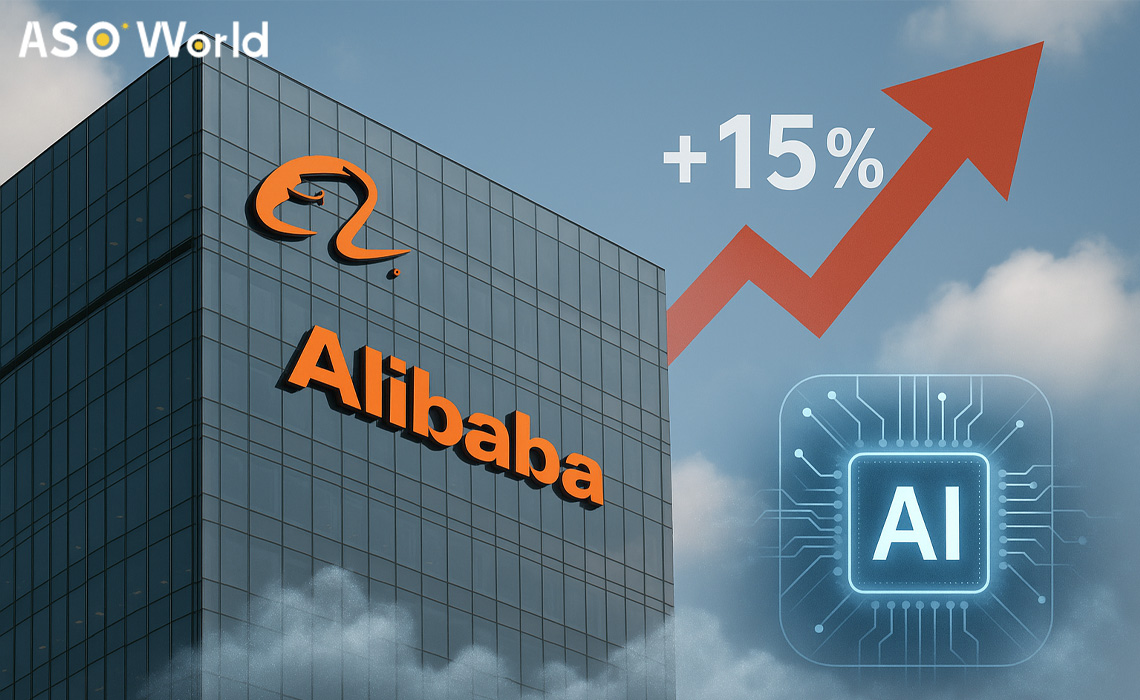Alibaba Group Holding Ltd.’s Hong Kong-listed shares surged 15% on September 1, 2025, marking the largest single-day gain since November 2022. The rally, which added over $50 billion to the company’s market value, was fueled by robust artificial intelligence (AI) revenue growth and strong cloud computing performance, despite a broader decline in Asian markets following a Wall Street tech selloff.
Stellar Cloud and AI Performance
Cloud Intelligence Group Shines
The Cloud Intelligence Group reported a 26% year-on-year revenue increase, reaching 33.4 billion yuan ($4.7 billion), the fastest growth in three years. This surge was driven by soaring demand for AI-related products, which achieved triple-digit revenue growth for eight consecutive quarters.
CEO Eddie Wu noted that AI-related products now account for over 20% of external customer revenue, underscoring the division’s pivotal role in Alibaba’s growth strategy.
Proprietary AI Chip Development
Alibaba is developing its own AI chips to reduce dependence on foreign GPU suppliers, enhancing efficiency in Chinese data centers. This move aligns with China’s push for technological self-reliance amid U.S. export restrictions. The company’s strategic focus on AI infrastructure, including its Qwen AI models, positions it as a formidable competitor to global tech giants like Microsoft and Google.
Mixed Financial Results
Revenue Growth Falls Short
Despite the cloud division’s success, Alibaba’s overall revenue of 247.65 billion yuan ($34.6 billion) for the June quarter grew only 2% year-on-year, missing analyst expectations of 252.9 billion yuan. Net income rose 78% to 43.11 billion yuan, largely due to gains from equity investments and the disposal of Turkish e-commerce firm Trendyol. However, excluding these gains, net income would have declined 18%, reflecting challenges in the competitive instant commerce market.
Margin Pressures from Competition
Alibaba faces intense competition in its Ele.me food delivery unit, contributing to margin pressures. Rivals like JD.com and Meituan are engaged in aggressive price wars in food delivery and online retail, impacting profitability. Despite these challenges, Alibaba’s focus on high-value AI and cloud investments signals a shift toward long-term growth over short-term margins.
Broader Market Context
Asian Markets Decline
The Alibaba rally contrasted with a broader downturn in Asian markets, driven by a Wall Street tech selloff led by Nvidia and Marvell Technology. The MSCI Asia Pacific Index fell 0.2%, with Japan’s Nikkei 225 dropping 1.8% due to declines in chipmakers like Samsung Electronics. Geopolitical tensions, including U.S. restrictions on chip-gear exports to China, further weighed on the sector.
China’s Tech Sector Resilience
Alibaba’s performance lifted other Chinese tech stocks, with Baidu rising nearly 6% and Tencent climbing over 3%. Analysts view Alibaba’s AI-driven growth as a sign of China’s tech sector closing the gap with U.S. peers, bolstered by innovations like DeepSeek’s R1 model. This resilience highlights Alibaba’s strategic pivot toward AI and cloud services amid global trade challenges.
Editor’s Comments
Alibaba’s 15% stock surge reflects investor confidence in its AI and cloud strategy, positioning it as a leader in China’s tech renaissance. The triple-digit AI revenue growth and proprietary chip development signal a bold pivot from e-commerce to cutting-edge technology, aligning with national goals for self-reliance. However, margin pressures from fierce competition and a modest 2% revenue increase raise concerns about short-term profitability.
The broader market downturn, coupled with geopolitical risks, underscores the volatility facing Chinese tech firms. Alibaba’s $380 billion investment plan over the next three years could solidify its global AI leadership, but success hinges on navigating competitive and regulatory challenges effectively.

